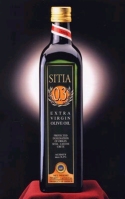
Crete Wins International Olive Oil Competition for Second Consecutive Year -- by Nikki Rose ***
Today, the Union of Agricultural Cooperatives of Sitia holds the Gold Medal, in the intense fruitiness category, awarded by a panel of experts at the International Olive Oil Council's Extra Virgin Olive Oil Competition. A David among the Goliaths of 33 Council members who made the finals from Egypt, Greece, Italy, France, Portugal and Spain – this is the second consecutive year that Sitia Cooperative has earned the Mario Solinas Quality Award, named after one of the scientists who developed a set of criteria to assess the quality of olive oil based on sensory analysis. If this were a wine competition, one may say the categories of intense, medium to light fruitiness range from the big, robust reds to light whites – something for everyone.
Sitia's extra virgin olive oil is the color of a spring forest reflecting golden rays of sunlight. Its texture is rich like a fine aged port. The flavor is clean – like olives and as intense as the earth the olive trees share, with a hint of walnuts and wild herbs. This type of olive oil plays a leading, rather than supporting role in cuisine. Since most people in Crete produce nothing but extra virgin olive oil, it flows more liberally than fresh water and is used in everything from seasonal salads to a simple puree of yellow split peas, to cumin-scented braised goat, or delicate honey-laced walnut cake. A coveted stash of Sitia's olive oil may be worshipped more simply: Let the Minoan gold steep with an equally worthy ruby-ripe tomato and collect every last drop with stellar whole-grain bread. * During the centuries of foreign occupation, bulk and local production replaced branded, and quite a bit of this region's surplus still goes off in tanks to Italy to be blended and sold under their labels. Reference: www.internationaloliveoil.org, www.sitiacoop.gr Nikki Rose is an editor, cultural-culinary writer and seminar host, as well as the founder and current director of the World Culinary Arts organization which sponsors seminars to preserve the culinary arts with renowned chefs. She specializes in pieces on culinary and cultural arts, as well as agricultural and environmental issues. Among her publications are contributions to 30 Secrets of the World’s Healthiest Cuisines (John Wiley & Sons), Sustainable Tourism in Crete, Organic Farming in Greece, and coverage of Greece’s Evros Delta, Dadia National Forest, and alternative tourism.
|
|

